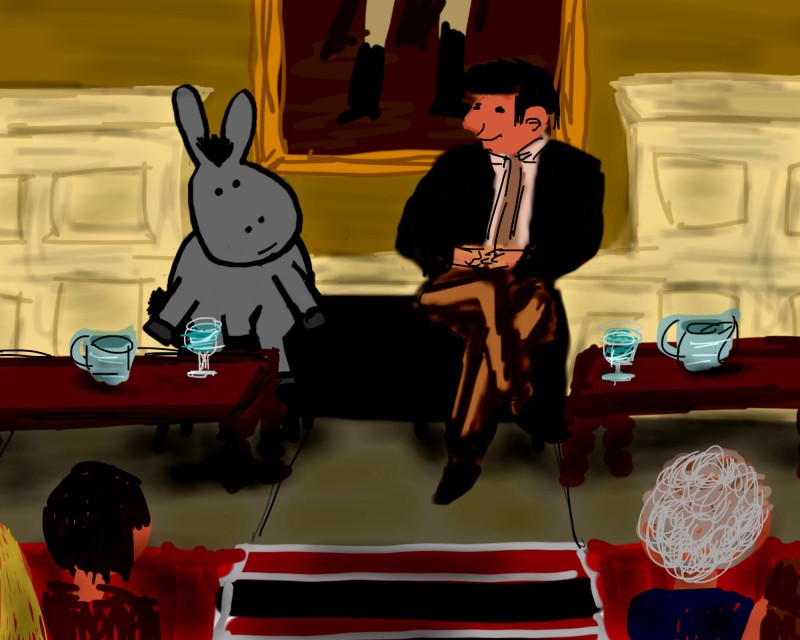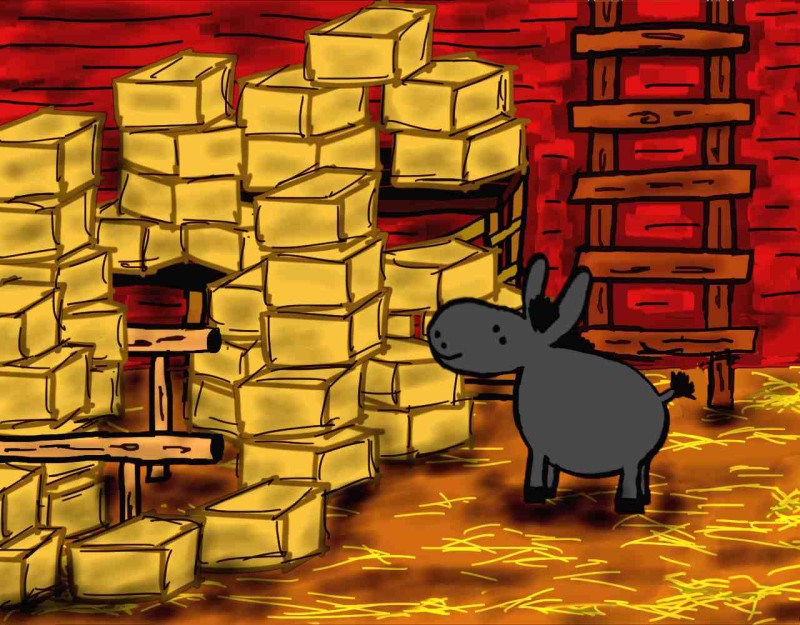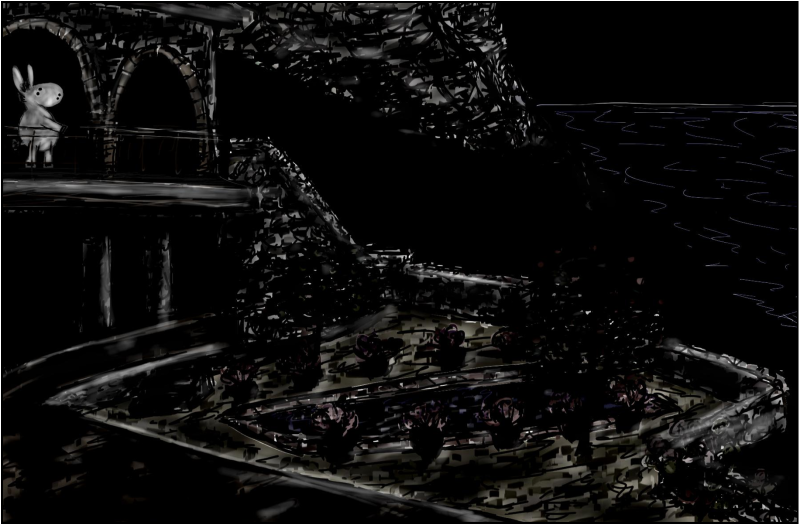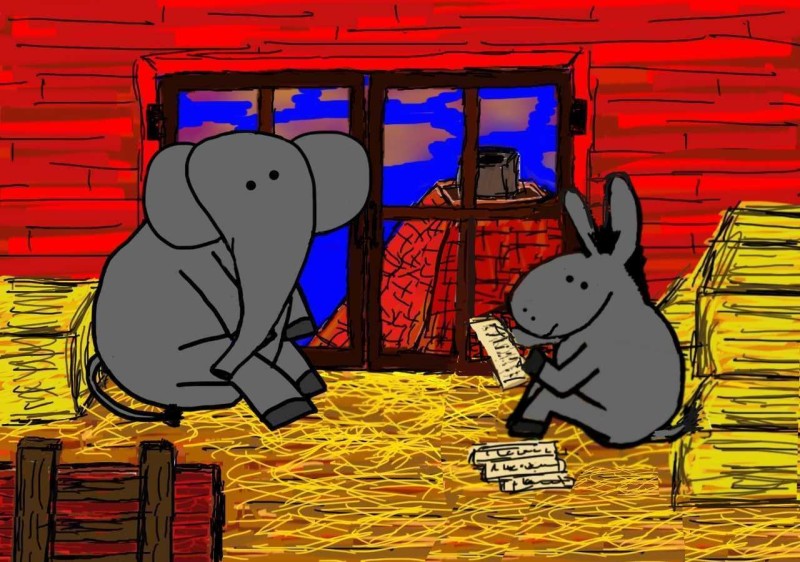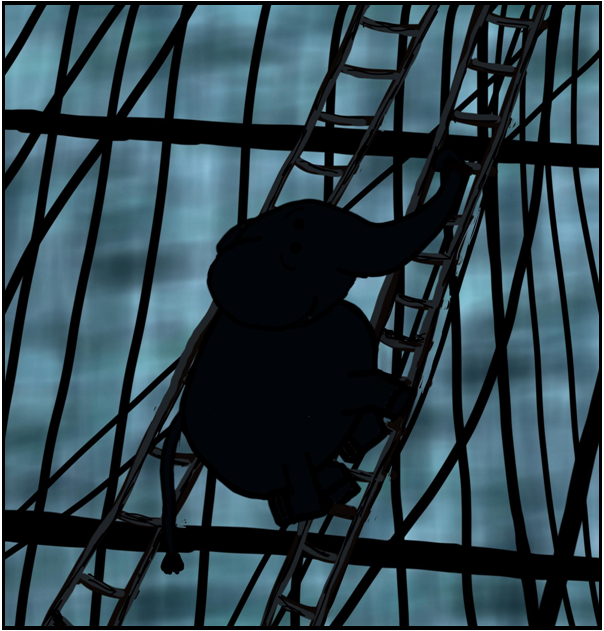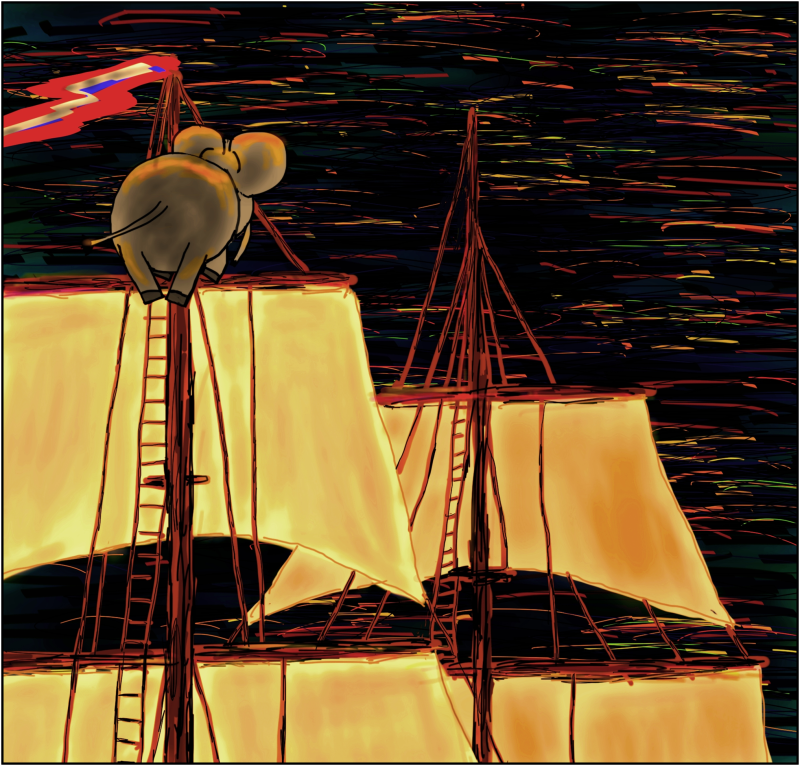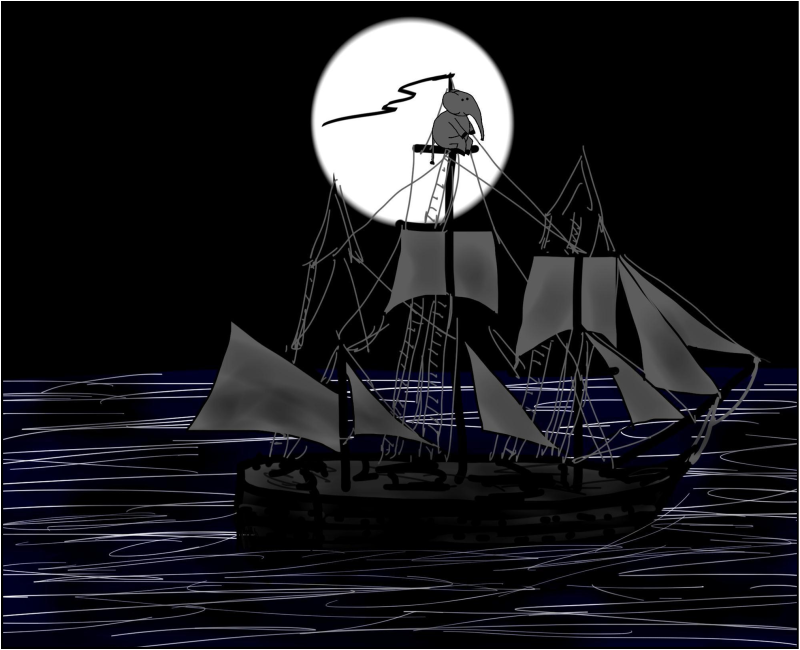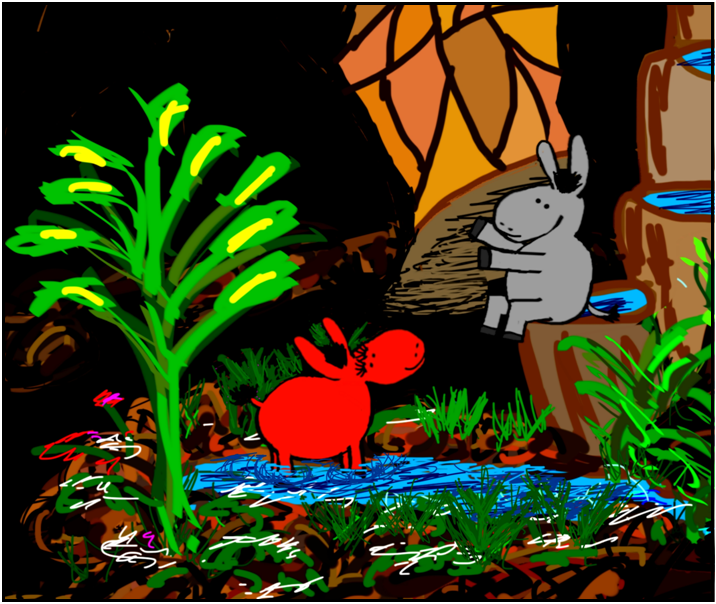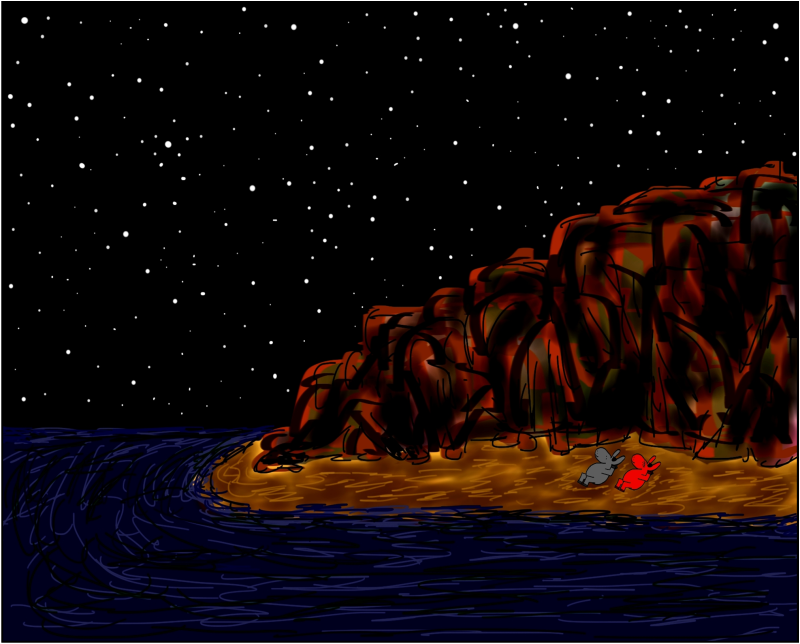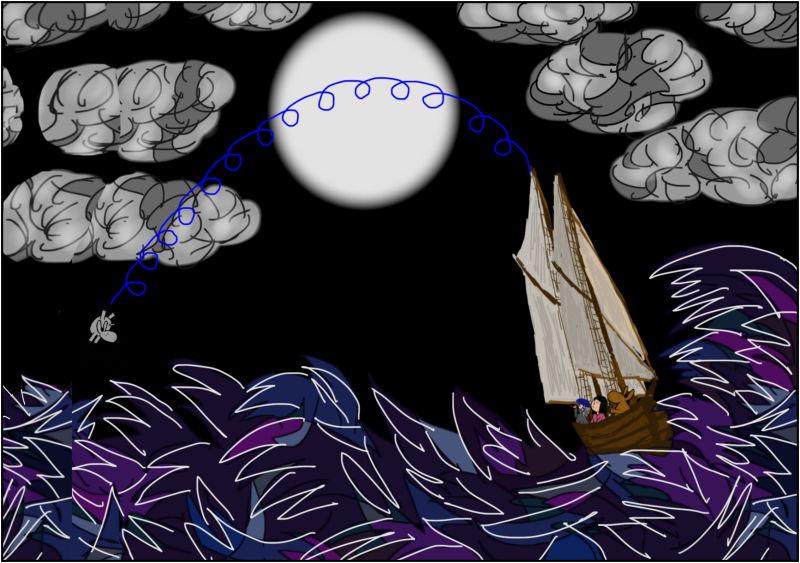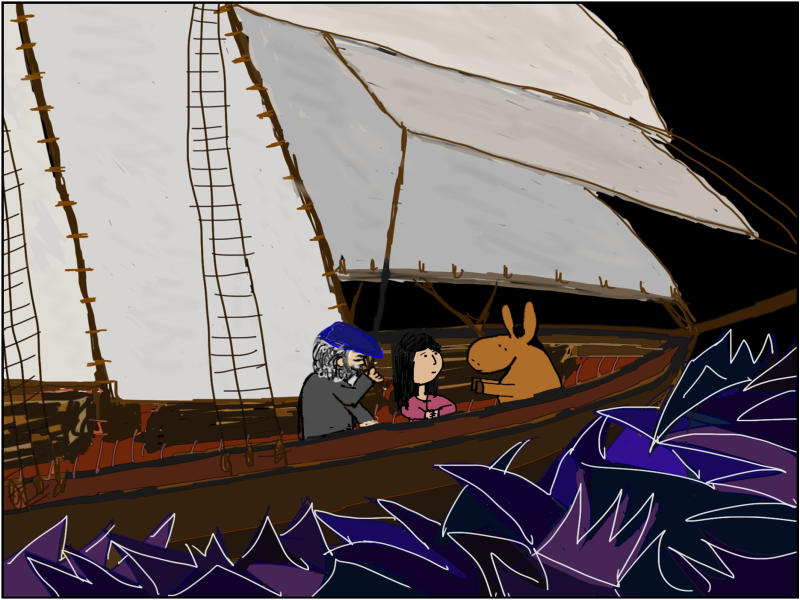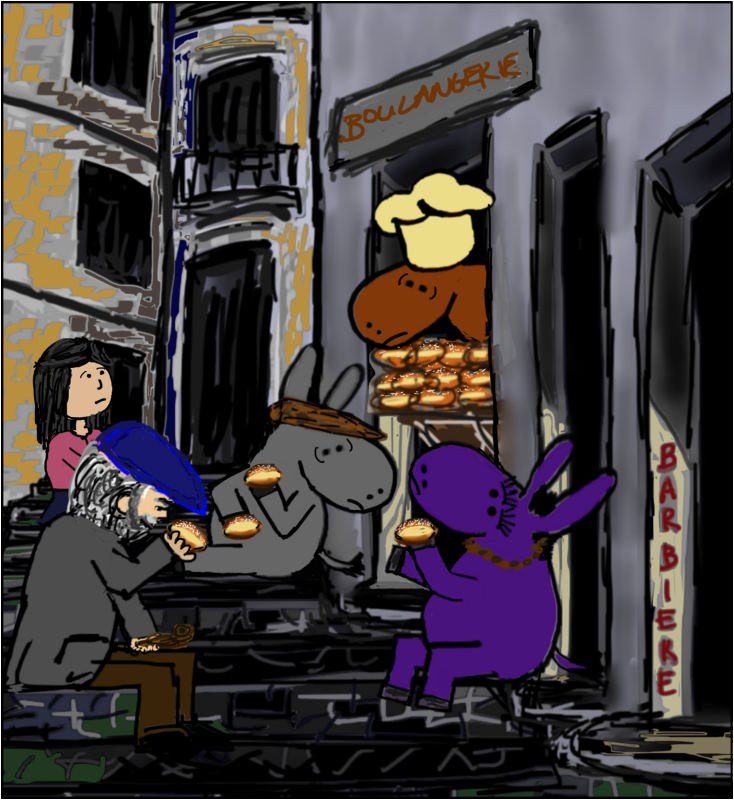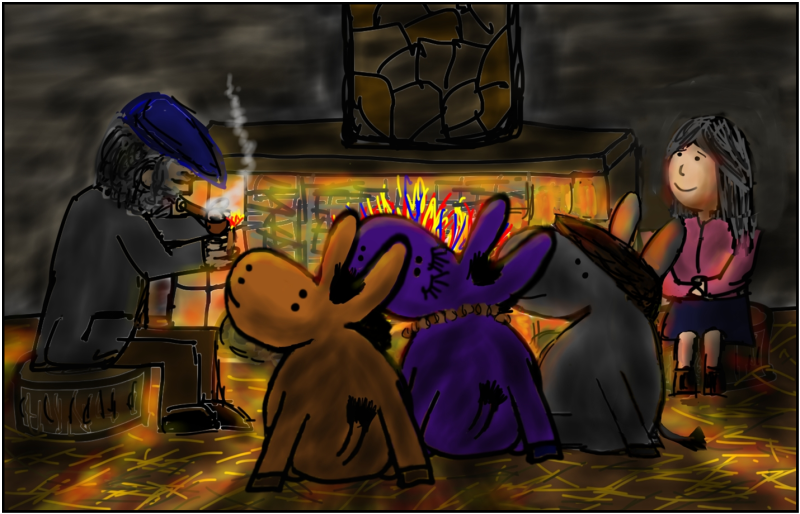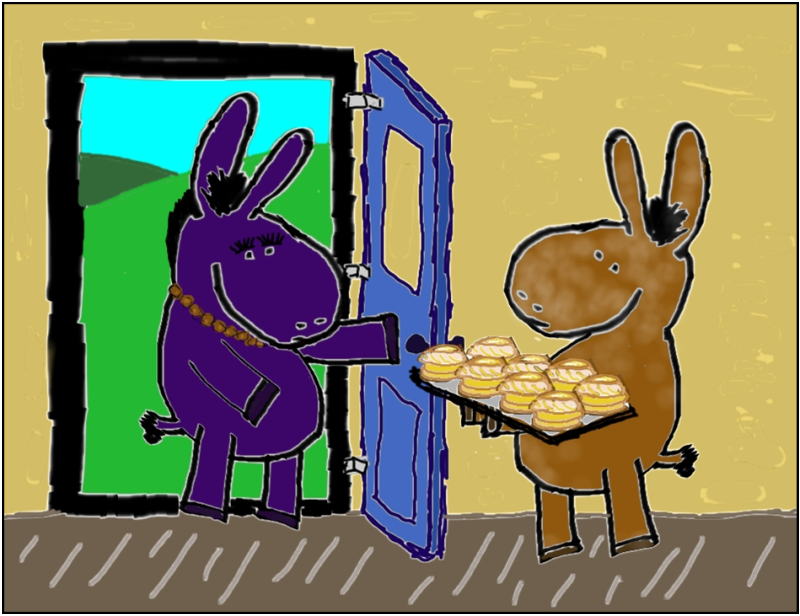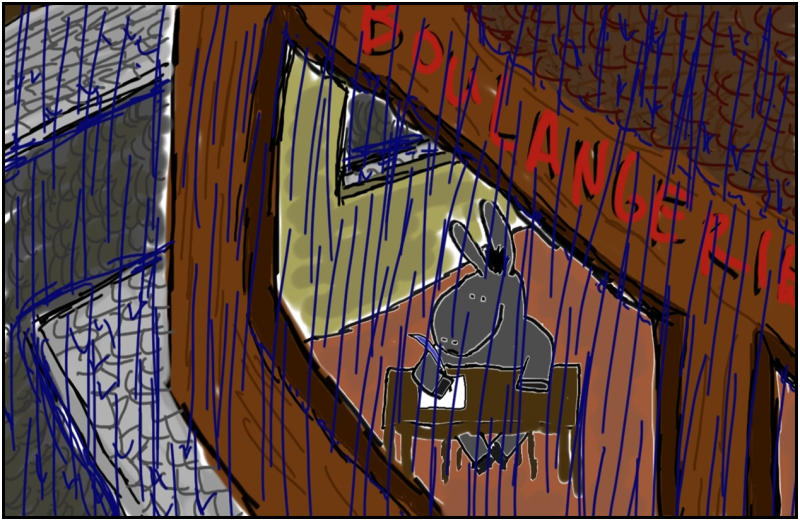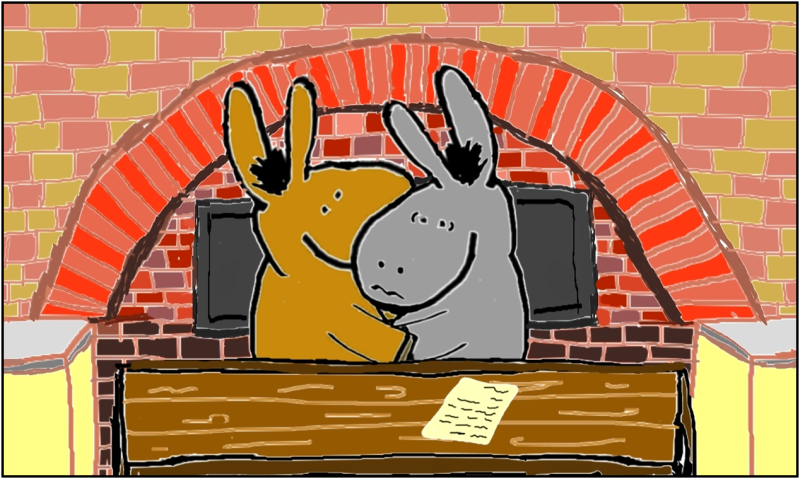“Welcome to tonight’s roundtable discussion sponsored by ‘The Campus Institute of Political Seriousness for Enhanced Living in an Unenhanced World.’ I’m your host, Jonathan Wellborn Truington III, and joining us this evening is Mr. Blurtso Lundif, a former diversity fellow at Harvard College who has come to speak about his new novel.
“As I recall, Mr. Lundif, the last time we visited you were making a name for yourself by standing in the snow.”
“Yes,” said Blurtso.
“Perhaps you could describe your novel. What’s it about?”
“It’s about an eighteenth-century pirate donkey,” said Blurtso, “who sails the Mediterranean in search of fortune and fame.”
“I see,” said Mr. Truington, “and why does he stand in the snow?”
“He doesn’t,” said Blurtso.
“He doesn’t?” said Mr. Truington.
“No,” said Blurtso.
“Then what is so special about him?”
“He’s an eighteenth-century pirate donkey,” said Blurtso, “who sails the Mediterranean in search of fortune and fame.”
“Does he give the booty he steals to the poor?”
“No,” said Blurtso.
“Does he help overthrow the tyrannical king, Louis XVI of France?”
“No,” said Blurtso.
“Does he choose a female donkey as his first mate, and promote feminist reform in the equine world?”
“No,” said Blurtso.
“Does he give his life to a cause greater than himself, discover a cure for cancer or found a new religion?
“No,” said Blurtso.
“Then why,” said Mr. Truington, “should anyone buy your book?”
“They shouldn’t,” said Blurtso.
“They shouldn’t?” said Mr. Truington.
“No,” said Blurtso.
“Why not?” said Mr. Truington.
“Because,” said Blurtso, “people shouldn’t buy things they don’t really need.”
“I see,” said Mr. Truington. “Well, ladies and gentlemen, there you have it. Thank you, Mr. Lundif, for taking time out of your busy schedule to speak to us about your extraordinarily uneventful novel. I’m sure the audience will join me in wishing you well in your future endeavors, and in hoping that your second novel will be more interesting than your first.”
Tag: french pirates
“Blurtso and the books” (II)
Wow, thought Blurtso, counting the twenty Patrick O’Brian novels I have, and my copy of Leaves of Grass, I now have a library of 5,021 volumes… five thousand of which I wrote myself.
“Blurtseau Lundif – Corsaire Extraordinaire” (XII)
“Another day,” thought Blurtseau, “and another night. The king is dead, and those who killed the king are dead, and Napoleon consolidates his power while those who would kill him wait in the wings. And the once-full moon that illuminated my vainglorious victory now wanes with a warbling light. Tomorrow the fighting will begin anew, the British, French, Spanish, Dutch, German, Italian, Sardinian, Greek generals… and all the world spins with the bones of the living and the bones of the dead, so many dead, those who pursued a borrowed or inherited dream, white bones in the soil, white bones in the surf of the sea, bones as white as the flickering tail of the waning moon, sparking and submerging among the breakers, flickering water reflection of fleeting sun echoed upon half-eaten moon, half-eaten moon half-eclipsed by the globe it now reflects down upon… half-eaten glow that grows dimmer each day… until the moon, the day, the night, and all our blood-urgent exploits fall dark upon the darkness of the sea, and vanish in the low laving sound of the waves eating the rocks with their dance of disintegration.
“And when the moon goes black, the stars will mark my path to Montecristo where Echo, alone on her island, watches the same silver flicker on a different surface of the same sea. And the light that flickered in her heart? Has it fallen prey to the same dance of deterioration? Will I find the moon already extinguished in the sea of her breast? Eclipsed by the vainglorious sphere that was my haste to depart? The misguided course of this star-crossed corsaire pursuing a sinking star? Yesterday’s hero is the dark side of the earth facing the dark side of the moon, is darkness double, two-faced night’s faceless faces, an echo of existence which touches no ear, a shout across an infinite expanse, an unreciprocated smile, a source without destination, a word from the heart that never arrives.”
“My heart is an echo of the disintegration
of the heart of the universe
that penetrates and disintegrates my own heart.”
“Blurtseau Lundif – Corsaire Extraordinaire” (XI)
At this point we meet a British sea captain named Alecs of York, and an elephant named Arlan de Borneo. An elephant? said Harlan. Yes, said Blurtso.
As he returned to his post, Arlan considered the life he had led and the peril that lay in the offing. Dr. Arlan de Borneo had run a successful medical practice in Dover until the unlucky day he botched a routine tonsillectomy on the town constable, rendering him aphonic for life. As a result his practice faltered, and he was forced to seek employment at sea. The ships sailing under Captain Alecs of York had a long-standing reputation for being the most casualty-ridden in the fleet, and as a result the captain struggled to find physicians for his ship.
With no other options, Arlan accepted a post on the Manhattan, but because of his inordinate size and the limited crew that could subsequently be housed, he was obliged to perform the duties of a dozen men. Fortunately, it was a charge he was able to fulfill, for he could effortlessly clasp a line and pull with the force of twenty hands, and could labor for days without sleep. Although he was, by nature, a gentle soul, it was clear that if he were ever roused to anger, he would wreak more havoc than a regiment of Her Majesty’s finest.
Aboard the Manhattan he was given the store room at the stern of the middle deck in which to sleep, but as he rarely slept, the space soon became a game room in which he and Captain Alecs passed slow hours in contests of two-king chess. The contests pleased and frustrated Lord Alecs, for he had never encountered a player whose skill rivaled his own, and though he won more than he lost, it seemed that luck played an inordinate role in his victories. Arlan enjoyed the matches as well, though for different reasons. It had only taken him a few games to unmask his Captain’s strategy, a strategy based on aggression, in which Alecs was willing to sacrifice any number of pieces if the maneuver brought an element of surprise and led to the rapid and dazzling defeat of his opponent. Once Arlan understood this, he was never surprised again, and from then on he was forced to lose matches on purpose to keep the tally leaning in the Captain’s favor. The same aggressive maneuvers, Arlan understood, might be equally effective at sea, but only if Lord Alecs was unknown to the enemy. An astute commander who had engaged him before, and survived his first attacks, could redirect the aggression back to its source, and so, as the reputation of Lord Alecs and his tactics became better and better known, his career moved more swiftly to its end.
With all this in mind, Dr. Arlan de Borneo was not the least surprised when the Manhattan sailed directly past L’Isle d’If and straight toward the mouth of the Marseilles harbor, where it attacked the first ship it encountered, hoping to capture a crew member who would know the whereabouts of Blurtseau Lundif.
“Aaarrgghh!!!” growled Alecs. “Sixteen sheets to the wind!!!
Into the devil’s kiln!!”
“Blurtseau Lundif – Corsaire Exraordinaire” (VIII)
Blurtseau told Echo about his life before the island—his voyages, the battles he had fought, the perils he had overcome—but though she listened with enthusiasm, she could scarcely imagine the things he described, for they were all things she had never seen. Bloodshed, of which there was much in his stories, was unknown on the island, and though she had witnessed aging in other animals—the goats in particular—the only deaths she had seen were the result of natural cause, and it seemed to her no more troubling than a deep and dreamless sleep. As for the humans, who commanded so much attention in his stories, she had never seen one, and could only picture them as hyper-contentious goats walking upright. The towns and cities were unreservedly fantastic. She could not believe there were such things as streets and houses and palaces constructed from predetermined plans; a physical world built on the airy blueprints of imagination. She concluded that these magical creatures needed to do little more than imagine an object to make it appear, but she wondered why they chose to live in an artificial world rather than the real one that was already around them.
Blurtseau, for his part, found Echo’s innocence to be as unimaginable as his lack of it, and he began to understand that what he saw, even the simplest object on the island, bore little resemblance to what she saw. And the meanings that he understood when he used the words he used were not the meanings she understood when she heard them. But he was enchanted by her innocence, and longed to know what it was like to live in her world, and she was content to play Desdemona to his Othello, losing herself in his tales, imbibing adventure as if slaking her thirst at a secret and mysterious spring.
“Blurtseau Lundif – Corsaire Extraordinaire” (VII)
At this point in the novel, said Blurtso, Blurtseau Lundif and his friends have intercepted the British sugar ship and are fleeing for their lives…
Claude did as directed, with the British sloop behind, until pursuer and pursued were lost from sight beneath the watery peaks. Blurtseau, who could no longer see the enemy ship, turned to descend the rigging, but before he could, a wall of water struck the schooner, causing the hull to rock and roll, and throwing our hero—as if he had been pitched from a catapult—into the frothing jaw of the sea. His companions watched in horror as he soared, head over hooves, describing a perfect parabola across the moonlit sky.
“Blurtseau!” called Pableau.
“Blurtseau!” called Josette.
“Blurtseau!” called Claude. But their comrade could not hear, or if he could, he could not reply, and the rudderless ship, steered now by the storm, drew quickly away, leaving our hero bobbing like a cork on the writhing water.
“We must turn and find him!” cried Pableau.
“Turn whither?” said Claude.
“Blurtseau is an excellent swimmer,” said Pableau. “I’m sure he’s secured a plank, or piece of driftwood, and is paddling for calmer seas. If we circle, describing a broader and broader circumference, we’ll cross him with our bow.”
“Yes,” said Claude, “when the storm has settled.”
And so they waited, tossed and turned in the belly of the gale, until the sky cleared. By dawn the British frigate, carried east with the careening clouds, was no longer to be seen, and the Zurrabelle was free to begin her search.
They sailed for fourteen days and fourteen nights, each day broadening the scope of their search, and each day encountering only sea. On the morning of the fifteenth day Pableau, perched on the foremast, thought he had spied his lost friend, but he was soon dismayed when closer inspection revealed a dark-grey dolphin. Josette, who had been holding up bravely, burst into tears, and Claude drew slowly and solemnly upon his pipe.
“Blurtseau Lundif – Corsaire Extraordinaire” (VI)
“These chantillies are delicious!” said Blurtseau.
“Enjoy them while you can,” said Pableau, “they’re the last ones I’ll bake.”
“What?!” said Blurtseau.
“Yes,” said Zurrabela, “haven’t you heard? The British have taken Haiti and cut off the French sugar supply.”
“Can’t you get it somewhere else?” said Josette.
“I’m afraid not,” said Pableau, “90% of France’s sugar is imported from Saint Domingue, that is, Haiti, and the fraction that now remains is taken directly to Paris.”
“Quelle catastrophe!” cried Blurtseau.
“What can you do?” said Josette.
“Nothing,” said Zurrabela, “except discontinue pastries and bake only baguettes.”
“I’ve been thinking about your sugar problem,” said Claude, “and I have an idea.”
“Yes?” said Pableau.
“A friend of mine owns a fishing schooner, and he owes me a favor.”
“A favor?” said Zurrabela.
“Yes,” said Claude, “I saved his life in 1772, and he has agreed to lend me his boat for a short excursion.”
“An excursion?” said Blurtseau.
“Yes,” said Claude, “a sugar excursion.”
“What do you mean?” said Pableau.
“As you may know,” said Claude, “the British have been trying to befriend the Knights of Malta in order to gain an outpost in the Eastern Mediterranean, and they have been sending them shiploads of sugar and tea. The British ships depart from Gibraltar, skirt the North African coast, then cross to the coast of Italy, down to the Strait of Messina, and on to Malta. They sail within sight of land at all times, except when they cross from Africa to Italy, at which point they are momentarily vulnerable to a pirate attack.”
“A pirate attack?” said Josette.
“Arrrrgghhhh,” growled Blurtseau, “a pirate attack!”
“Arrrrgghhhh!” growled Pableau.
“Arrrrgghhhh!” growled Zurrabela.
“Arrrrgghhhh!” growled Claude, Josette, Blurtseau, Pableau and Zurrabela.
“Blurtseau Lundif – Corsaire Extraordinaire” (V)
At this point in the story, said Blurtso, Blurtseau Lundif, reunited with Pableau in Roquebrune, France, questions the new course of his nation…
“I only want what is best for France,” said Blurtseau.
“What you want,” said Zurrabela, “is a reality that can be measured, a world that can be defined; not a process, but a paralysis.”
“I want a consistent process,” said Blurtseau, “one in which the principles of right and wrong are constant, and I can act with certainty.”
“But that is not a process,” said Zurrabela, “that’s a closed sphere that excludes all that lies beyond it, an imaginary world that denies the world at large. In all the battles you fought, on land and at sea, did it never occur to you that the enemies you faced believed that they were as ‘right’ and ‘justified’ in their beliefs as you were in yours? If you look closely, you will see that the dynamic that once took place beyond the borders of France, is now taking place within.”
“Yes,” said Blurtseau, “I see that, but I can’t tell which group is right, which group has the true interest of France at heart.”
“That,” said Zurrabela, “is for your countrymen to decide. It is the essence of democracy, and the responsibility that accompanies the future you seek. You can no longer be a follower, obeying as you would the lead of a king. Your country has set sail for a new world, a world whose challenges go beyond the question of national obedience, to the greatest challenge of all, that is, governing your self, coming to your own conclusions and acting on personal conviction. What is right? What is wrong? For France, for others, for me? These are the questions that each citizen must ask, the questions that your fellows are risking their lives to be able to ask.”
“Blurtseau Lundif – Corsaire Extraordinaire” (IV)
At this point in the story, said Blurtso, Blurtseau Lundif and his faithful First Mate, Pableau la Chanson, are hiding from French spies in Sagres, Portugal. Pableau, having recently fallen in love, has gone to Evora in search of a beautiful donkey he saw only one time in Sagres…
The day dawned damp and chilly, long after Pableau had risen from his water-logged straw to fire the bakery ovens. He had been toiling for hours when the first customers arrived, and by then the air in the shop was warm and dry, and even the cracks in the walls were thick with the scent of bread. Although it had been more than three months since his arrival, and though his excursion to the villa had been in vain, Pableau’s resolve remained firm, for despite his repeated failures he knew that the story of the boulanger in search of the hoof was making its way around town, and that notice of his existence would eventually fall upon the ears of the one he sought.
He was consoling himself with this hopeful, patient logic as he placed a fresh tray of chantillies in the pastry window, when a carriage suddenly appeared on the street, and before he could comprehend what was happening, he saw the most beautiful donkey in the world descend from the coach…
“Are you Pableau the baker?” she asked, when she had stepped inside.
“Yes,” said Pableau, “I am.”
“And you have been seeking me for over three months?”
“Yes,” said Pableau, “I have.”
“Having seen only my hoof? And having seen it on only three occasions?”
“Yes,” said Pableau.
“And you have been discovered in the garden of my quinta,” she said, “by my eyes and others’, skulking about the shrubberies?”
“That,” said Pableau, “I cannot say, for your eyes may well have seen me, but mine, sadly, did not see you. But yes, he continued, I was indeed on the grounds, for I bribed the gatekeeper to let me pass.”
“I see,” said Zurrabela, “and now, may I know what you expect of me?”
“I expect nothing,” said Pableau, “I only hope.”
“Hope?” said Zurrabela. “And what do you hope?”
“I hope,” said Pableau, “that yours is the heart I am seeking, and that mine is the heart you seek.”
“But,” said Zurrabela, “that hope is without reason, for you have sought only a hoof.”
“Yes,” said Pableau, “that is true, but I know my heart, and my heart knows reasons that reason knows not.”
“But how can you be sure,” said Zurrabela, “that I seek any heart at all?”
“I cannot be sure,” said Pableau, “I can only hope.”
“Yes,” said Zurrabela, “as you have said… may I know how long you will lodge in Évora?”
“Until my dreams are answered,” said Pableau, “or until they expire.”
To this last statement Zurrabela did not respond, but only gazed at the flour-covered donkey who had searched for her, tirelessly, having seen only a hoof. Pableau, too, remained silent, meeting her glance with one of his own, a glance that was open, unguarded, and fortified with conviction. Then Zurrabela made a motion to speak, but stopped, collected herself, and left the shop. Pableau remained inside, watching to see if she would make herself seen at the window of her coach, but she did not; instead he saw only what he already knew, an incomparable hoof, waving to the driver, in a gesture to depart.
“Blurtseau Lundif – Corsaire Extraordinaire” (III)
As the weeks passed, Blurtseau continued to write, even when he received no reply…
Ma chère Soiselle, Again I pause to compose your daily note. And again I wait, but receive no reply. The days have become weeks, and the weeks have become months, and with each passing minute I pass a timeless eternity. You will not write. You will not be seen at your window. And the faithful messenger who delivers my notes, meets only the chambermaid at your door. I am adrift on a sea of doubt, and there is no shore in sight.
Respectfully, your supplicant and servant,
Blurtseau L’un d’If
and then one day, the reply arrived…
My dear Blurtseau, With heavy hoof I inscribe the sounds you have long feared to hear. I am gone. I have fled with the cousin of the King. I am his, and he is mine. Proximity has conquered distance. Despite the pain this will cause, I hope we can still remain friends.
adieu,
Blurtsoiselle
Blurtseau Lundif could not believe what his eyes had read. It was as if he was deciphering a language he did not understand and his guess at its meaning was surely mistaken. He read the words again. And again. Finally, he realized the letter was not written in a foreign tongue, and he did comprehend its meaning, and Blurtsoiselle was indeed saying what her words were saying, and she had given her heart to another, and her affections, and her soul which had been the North Star guiding Blurtseau through his endless nights. And he was annihilated. “I must find Pableau!” he said out loud. “For if I do not find a pair of loving eyes to assure me I am alive, I will simply cease to exist.” And in his greatest moment of misfortune, fortune was near, and when he cried out, “I must find Pableau!”
Pableau—who had just returned from his morning errands—heard his friend’s cry and rushed to his side, saying, “Here I am my friend, here is your dear and trusted friend Pableau.” And those thirteen words were, for an annihilated soul on the edge of extinction, a silver thread which Blurtseau grasped with every fiber of his being, knowing that if he held on, and never let go, that the thread would slowly restore him to the world of the living. “My friend,” said Blurtseau, “I who have been reduced to ashes and rubble, and scarcely have a breath to offer, owe you the world.” And the two donkeys embraced, as if clutching to life itself, amidst the boulangerie smells of flour, yeast, and baking bread.
